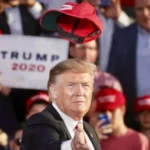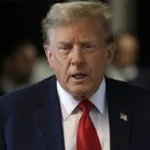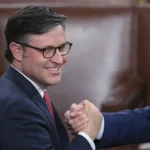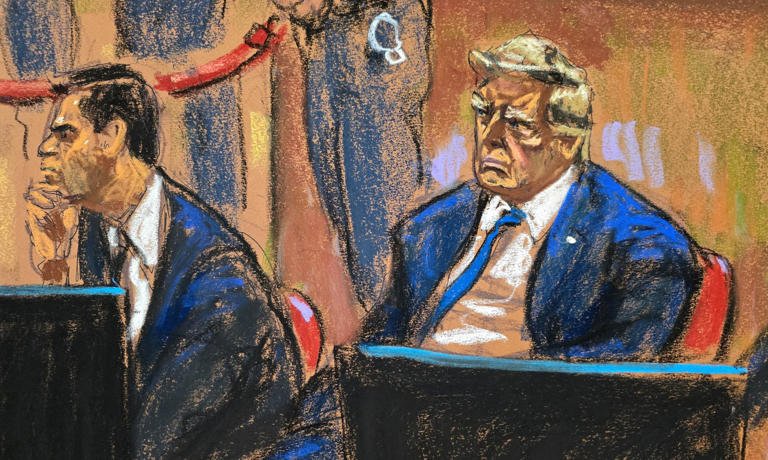With Donald Trump just a few feet away, a potential juror in the criminal case against him summed up the experience in just three words. “This is bizarre,” she said, with just a slight hint of a seasoned New York accent.
Bizarre it was. There was a potential juror who once spent the night at one of Trump’s lawyers’ homes more than a decade ago (Trump’s team used one of its pre-emptory strikes to remove the juror). The microphones didn’t work. The proceedings had to start over when Judge Juan Merchan realized that a court reporter hadn’t been present first thing. And the temperature in the courthouse was so frigid that Todd Blanche, one of Trump’s lawyers, asked Merchan if it would be possible to turn up the temperature “just one degree”.
Merchan said no. “It would probably go up 30 degrees,” Merchan said. “It is cold, there’s no question it is cold, but I’d rather be a little cold than sweaty, and really those are the choices.”
Today was just day three of a blockbuster trial that’s expected to last six weeks once a jury is selected. At the center of it was Donald Trump. Silent. Disarmed of televisions and social media, forced to sit expressionless over a grueling long day in a drab Manhattan courtroom.
This was not Donald Trump the business mogul or Donald Trump the 45th president. It was Donald Trump the defendant.
Trump was far from the comforts of the White House and Mar-a-Lago as he sat in the courtroom at 100 Centre Street. There was nowhere for him to go and nothing he could say; he was trapped. It was a stark reminder of the long slog Trump faces over the next two months or so as he faces 34 felony charges for falsifying business records.
When potential jurors, sitting just feet away, offered critical assessments of him and his presidency, the president, who is known for his inability to let even the slightest insult go, sat in silence. As his lawyer, Susan Necheles, read old social media posts from a potential juror that were highly critical of Trump, he sat silently.
Yet it would be a mistake to think Trump has been tamed or humbled. His Truth Social account has been alive with criticism of the court proceedings, both from his team and himself. Shortly after court convened on Thursday, prosecutors said Trump had violated a gag order in the case an additional seven times; the order prohibits him from making any threats against jurors or potential witnesses.
“It’s ridiculous and it has to stop,” Christopher Conroy, a prosecutor, said.
The effort was a reminder that even if Trump is silent while he’s in the courtroom, he’ll continue to use every tool at his disposal outside of it.
Donald Trump’s criminal trial is forcing the former president, a man who famously surrounds himself with sycophants, to sit quietly and listen to the unfiltered opinions of those typically kept at arm’s-length: People he might call his “haters.”
During jury selection, Trump has heard himself described by those under consideration as racist and sexist and a narcissist. He’s been presented with social media posts calling for officials to “lock him up.” He’s been told, to his face, that he’s “very selfish and self-serving.”
And through it all, Trump has been required to remain seated, not gesturing, not talking and not using his phone. He has not even been allowed to adjust the temperature a few degrees in a courtroom he described as “freezing.”
To top it off, some of those people — including the one who called him selfish and said she outright dislikes him — are now members of the jury of 12 Manhattanites who will decide whether to convict him of 34 felony counts of falsifying business records to conceal a sex scandal.
The jurors also include an Upper East Side woman who works as a speech therapist, a retired man originally from Lebanon who enjoys fly fishing, a father of three who works as a security engineer, and a woman originally from California who works in product development. The group, which represents a cross-section of Manhattan, has been commanded by the judge, Justice Juan Merchan, that they must put their feelings about the former president aside, and all 12 of them have vowed to do so.
Those dozen people were finalized Thursday after a third day of proceedings that amplified the trial’s unprecedented challenges: The defendant is not just a former president, but is also a man with a social-media megaphone who is quick to weaponize it.
At the start of the day, the trial lost two jurors who had been seated earlier in the week. Both expressed concerns about their identities being publicized.
Prosecutors, meanwhile, accused Trump of repeatedly violating a gag order in the case — most flagrantly, they said, when he claimed on social media on Wednesday that “undercover liberal activists” were “lying” to get on the jury. The prosecutors renewed their request for Merchan to hold Trump in contempt and fine him.
One of the jurors excused Thursday, an oncology nurse from the Upper East Side, called the court the day before to say that “after sleeping on it overnight, she had concerns about her ability to be fair and impartial in this case,” the judge said.
The woman said in court Thursday that she was alarmed about what had been publicly reported about her, and that her friends and family informed her that she had been identified as a juror.
“I don’t believe, at this point, that I can be fair and unbiased and let the outside influences not affect my thinking in the courtroom,” she said.
Another juror was dismissed after prosecutors said a man with the same name had been arrested in the 1990s for tearing down right-wing political posters, calling into question whether the man had been truthful in his answers during jury selection. The man also expressed “annoyance” at the amount of information published about him this week, Merchan said.
It wasn’t clear why the man was excused from the jury — or even whether he is, indeed, the same person whose arrest prosecutors uncovered.
When the trial opened on Monday, prosecutors told Merchan that Trump had, in recent days, violated the judge’s gag order three times. The gag generally prohibits Trump from publicly commenting on potential witnesses, jurors and other people involved in the case. On Thursday, the prosecutors raised the issue again with more alarm, saying that Trump has breached the restrictions seven more times. They called the former president’s behavior “ridiculous.”
The prosecutors want Trump fined $1,000 per violation. Merchan has not acted on the request, but has scheduled a hearing on the issue next Tuesday.
Assistant district attorney Christopher Conroy described the “most disturbing” new example as a social media message Trump posted on Wednesday evening quoting a Fox News host as saying, “They are catching undercover Liberal Activists lying to the Judge in order to get on the Trump Jury.”
Conroy also flagged several examples of Trump having posted on his campaign website and on his social media accounts about his former lawyer Michael Cohen, who is expected to be a key witness for the prosecution. The posts contained pictures of Cohen, and some contained links to a New York Post article calling Cohen a “serial perjurer.”
Trump lawyer Emil Bove disputed that Trump had violated the gag order, saying his “responses are political in nature.” Bove also disputed that Trump reposting others’ public comments violates the gag order.
In perhaps the final indignity of the day, Trump was deprived of a fresh set of targets when prosecutors denied him and his lawyers the routine step of disclosing the first three witnesses they intend to call when they begin presenting their case, likely next week.
“Mr. Trump has been tweeting about the witnesses,” prosecutor Joshua Steinglass said. “We’re not telling him who the witnesses are.”
“I can’t fault them for that,” Merchan replied.
Though Trump attorney Todd Blanche offered to prevent Trump from posting on social media about the witnesses, Merchan told Blanche, “I don’t think you can make that representation.”
Blanche pressed further, asking that the witnesses’ names be disclosed only to attorneys, but Merchan again rebuffed him, saying: “I’m not going to order them to do it.”










